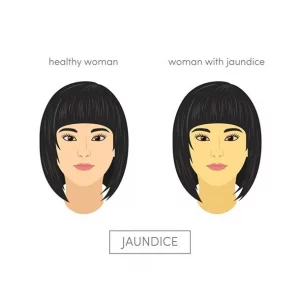Table of Contents
What is jaundice?

When your skin, mouth, or the whites of your eyes turn yellow, the condition is known as jaundice or icterus. It occurs due to the excessive secretion of bilirubin. Bilirubin is a yellow-orange bile pigment that makes your skin, eyes, and mouth yellowish.
When severe jaundice goes untreated, the condition is known as kernicterus. It is a type of brain damage resulting from high bilirubin levels in the blood. It can cause athetoid cerebral palsy (movement disorder) and hearing loss. In addition, kernicterus causes problems with vision and teeth. Sometimes, it can cause intellectual disabilities. Early detection and management of jaundice can prevent kernicterus.
How bad is my jaundice?
Mild: You may have itching and yellowing of the skin and the whites of the eyes due to increase in bilirubin level. Most of the time, mild symptoms can be safely managed at home by following the tips given in the section below.
Moderate: The symptoms are pale stools, chills, appetite loss, and dark urine.
Severe: See your doctor urgently if you have fever, confusion, intense abdominal pain, weight loss, and brain damage due to high levels of bilirubin.
How to manage mild jaundice or icterus ?
Keep track of your bilirubin levels using Ankr (myAnkr web portal or the Ankr app). It will help you describe the problem to your doctor or nurse.
- Maintain adequate hydration by drinking fluids, and rest as needed.
- Take medications only as instructed and prescribed by a health care practitioner.
- Avoid medications, herbs, or supplements which may cause detrimental side effects. Consult a health care practitioner for advice.
- Avoid alcohol
- Certain dietary restrictions
- If symptoms worsen or if any new symptoms arise, consult a health care practitioner.
How to manage moderate and severe jaundice?
See your doctor right away if your skin turns yellow. Your doctor may suggest blood tests to check for a high bilirubin level.
What causes jaundice?
- Reabsorption of a large hematoma (a collection of clotted or partially clotted blood under the skin).
- Hemolytic anemias.
- Viruses, including Hepatitis A, chronic Hepatitis B and C, and Epstein-Barr virus infection (infectious mononucleosis).
- Alcohol.
- Autoimmune disorders.
- Rare genetic metabolic defects.
- Medicines (acetaminophen toxicity, penicillins, oral contraceptives, chlorpromazine and estrogenic or anabolic steroids).
After the production of bilirubin,
- Gallstones.
- Inflammation (swelling) of the gallbladder.
- Gallbladder cancer
- Pancreatic tumor
Sometimes. it occurs with liver disease if you have:
- Chronic hepatitis or inflammation of the liver.
- Pyoderma gangrenosum (a type of skin disease).
- Acute hepatitis A, B or C.
- Polyarthralgias (inflammation of the joints)
